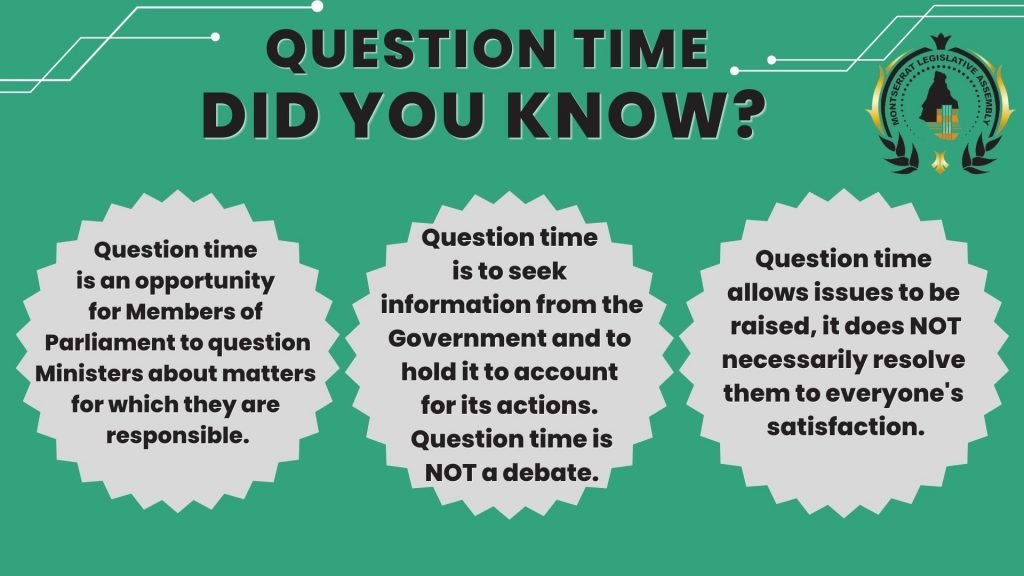Did you know?
Question time is an opportunity for Members of Parliament to question Ministers about matter for which they are responsible.
Question time is to seek information from the Government and to hold it to account for its actions. Question time is NOT a debate.
Question time allows issues to be raised, it does NOT necessarily resolve them to everyones’s satisfaction.
The Process
Step 1: Members of Parliament submit their questions to the Legislature Department by the 7th day before the sitting of the Legislative Assembly.
Step 2: The Speaker vets all questions against the Standing Orders to determine which is “Allowed” or “Disallowed”.
Step 3: Allowed questions are then forwarded to the respective Ministers, who must return their responses before the sitting of the Legislative Assembly.
Step 4: Members are then permitted to ask the respective Ministers their submitted questions in the sitting of the Legislative Assembly.
Did you know?
“Members cannot stipulate how Ministers reply (for example, insisting on a yes or no answer) nor can the Speaker require a reply to couched in one form or another.”
Mode of Addressing Assembly:
“If two or more Members rise or press their microphones at the same time,the Speaker or Chairman shall call on the Member who first catches his/her eye.”
Forms of Questions:
“A question shall not contain arguments, inferences, opinions, imputations, epithets, ironical expressions or hypothetical cases; nor shall a question refer to debates or answers to questions in the current session.”
“A question shall not include the names of persons, or statements, not strictly necessary to render the question intelligible, nor contain charges which the member, who asked the question, is not prepared to substantiate.”
“A question must not be asked for the purpose of obtaining an expression of opinion, the solution of an abstract legal case, or the answer to a hypothetical proposition.”
“A question must not refer to any debate that has occurred or answer that has been given in the current session, nor shall a question fully answered be asked again during the same session.”
“A question must not be asked about proceedings in Committee which have not been placed before the Assembly be a report of the Committee.”
“A question may not be asked as to the character or conduct of any person except in his official or public capacity.”
“A question reflecting on the character or conduct of any person whose conduct can only be challenged on a substantive motion may not be asked.”
“A question making or implying a charge of a personal character may be disallowed.”
Replies:
“A written reply to each question shall be read by the member to whom the question is put, and a copy of the reply shall be handed to the member putting the question: provided that with the consent of the Assembly such written reply may be taken as read.”
“A reply shall be confined to the points contained in the question, with such explanation only as will render the reply intelligible.”
Supplementary Questions:
“The reply to any question shall be conclusive and no speech or debate on the reply shall be allowed, but any member may, with the permission of the Speaker, put a supplementary question for the purpose of further elucidating any matter of fact not made clear to him by the reply; but a supplementary question must not be used to introduce matter not included in the original question”.
Disallowance of Question:
“The Speaker shall be the sole judge of the propriety or admissibility of a question and he/she may disallow any question which in his/her opinion is an abuse of the right to ask questions.”


